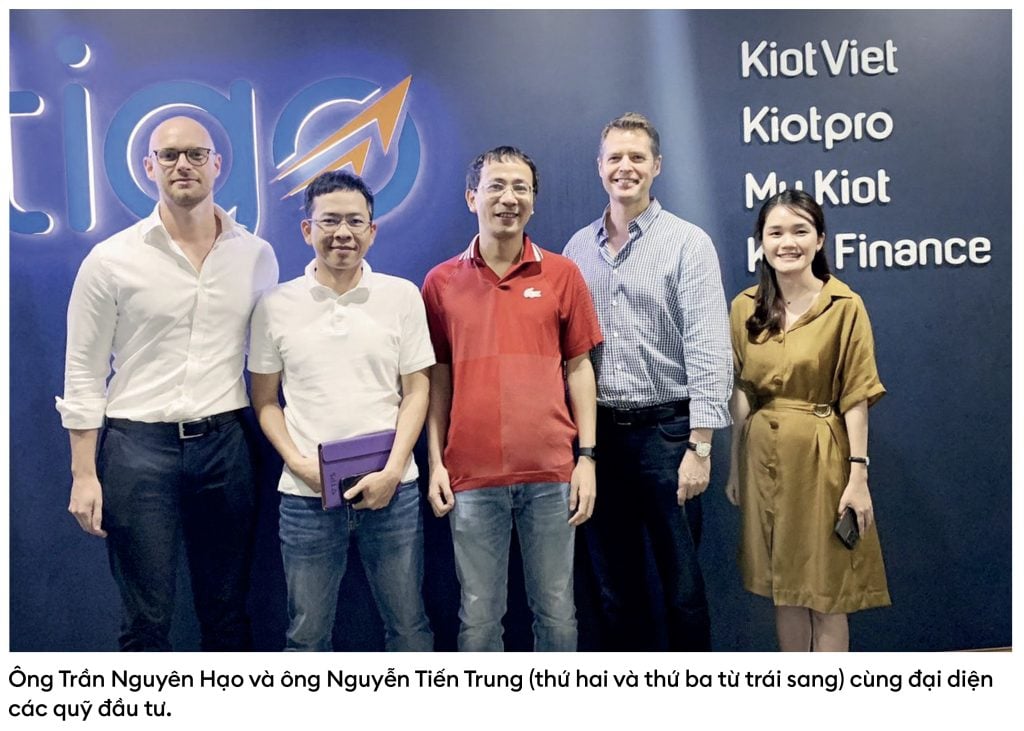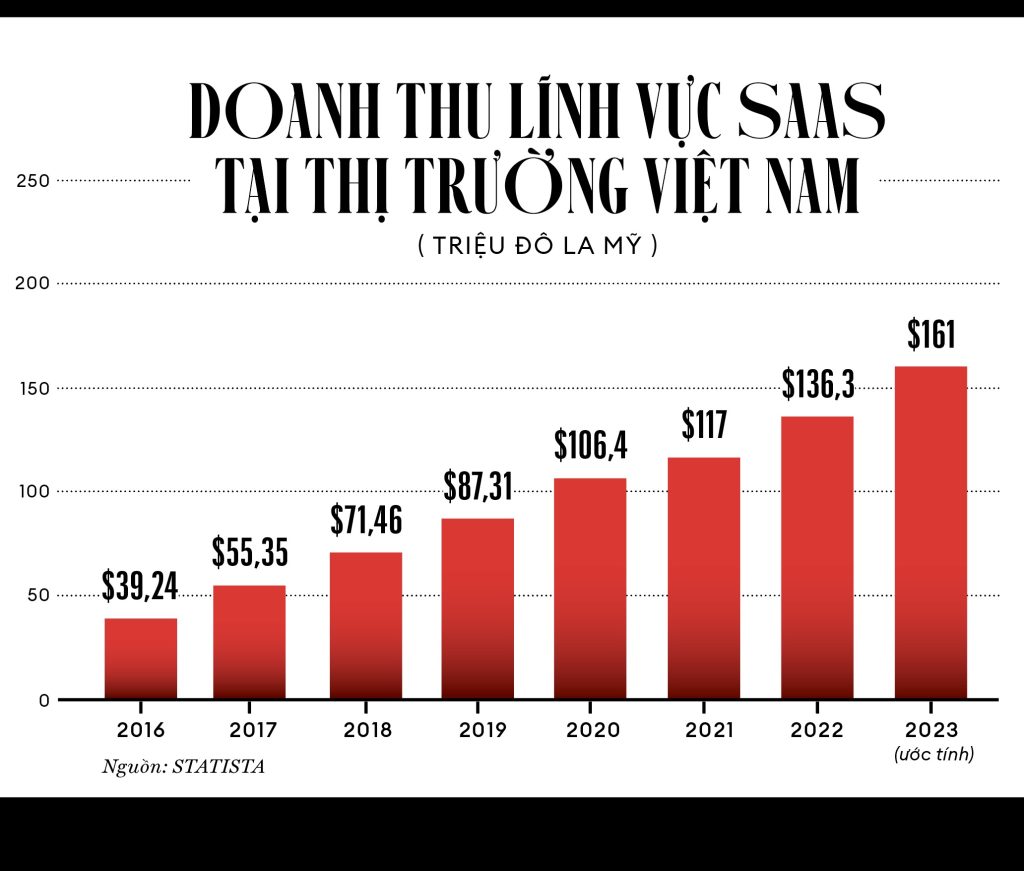The user experience at retail stores has made strides over the past few years that not all customers realize thanks to KiotViet, a sales management software built by the duo Tran Nguyen Hao and Nguyen Tien Trung, who have been together since elementary school.
One gloomy day eight years ago, a customer knocked on the door of Citigo Software Joint Stock Company’s office on Tran Khat Chan Street (Hai Ba Trung District, Hanoi ). The customer, who had 20 years of experience in selling furniture, met with the company’s leaders to complain about the inconvenient KiotViet sales management software, which was not suitable for the industry they were doing business in.
The KiotViet product development team of Citigo listened to feedback, then took notes and adjusted the features of the product, which was only one year old at the time. In the first five years since the launch of the KiotViet sales management software in 2014, the company received countless similar complaints. However, that was the motivation for the product development team to meet the needs of many industries.
Choosing the slogan “Get rich with you,” KiotViet puts customers at the center of all activities, finding answers, from where the company should focus to what products need to be designed for the future.
“The important thing is not whether customers give more or less feedback than before, but creating opportunities for them to give feedback. We have the same business philosophy, which is to listen to customers and satisfy them with valuable products, not to ‘run’ to see what competitors are doing,” Nguyen Tien Trung, co-founder of KiotViet, told Forbes Vietnam in an interview at the company’s headquarters.
The founders and operators of KiotViet are all technology engineers. How did they manage to make KiotViet a service management and operation software used by 200,000 businesses in 20 industries with their own characteristics? The principle throughout: Listening to customers. The company's staff of 2,000 people, including 1,200 sales staff and 400 technology engineers, has been revolving around this goal all this time.
According to estimates from the Ministry of Planning and Investment , Vietnam has about one million SMEs and about five million individual business households. According to Nextrans' 2022 Vietnam Startup Report, it is estimated that there are about 533 startups in Vietnam providing software services (SaaS).

In terms of age in the SaaS field in Vietnam in general, KiotViet is a latecomer compared to Misa , Maybanhang, Sapo... But if we consider only the group of software providers for sales management for family businesses and micro-enterprises, especially traditional stores, KiotViet is considered to be leading the market.
Some businesses in the same industry as KiotViet that Forbes Vietnam spoke to commented: “KiotViet is in a position to be a game changer in the SaaS segment serving small-scale groups”; “KiotViet is superior in the service segment serving traditional retail stores”; “The KiotViet team is a bit strange and secretive but focuses on products because making money from software is not easy.” According to their own statements, the total monthly revenue of stores using KiotViet is about three billion USD.
In the segment of point of sale (POS) and multi-channel sales management software, Nextrans believes that KiotViet is the leading name. In 2021, the company announced the completion of a series B round of $45 million led by KKR, bringing the total amount raised to more than $53 million.
In Forbes Vietnam 's May 2022 feature "Finding the Next Unicorn" , KiotViet is on the list of promising startups with the opportunity to develop into a unicorn - a startup valued at over one billion USD. Currently, KiotViet's representative did not disclose the exact valuation but estimated the figure to be around "200-300 million USD." The company said it had worked with about 100 investment funds before closing the deal, receiving investment from KKR, a private equity fund that has invested in Vinhomes, Masan Nutri-Science, etc.
It is estimated that there are about five million small and medium-sized businesses in Vietnam, mainly operating in the retail and F&B sectors. Before the emergence of sales management software, household businesses carried out management in the traditional way.
Software like KiotViet helps business owners perform simple tasks such as printing invoices, simple accounting, inventory management, and customer data. The challenge for service providers is that each industry will have its own characteristics. For example, the fashion industry needs software to manage regular goods by size and color, but the cosmetics and grocery industries will need features to manage by expiration date, or the F&B sector needs tools to manage ingredients, synchronize ordering from the kitchen to the dining table, etc.
According to Citigo, there are 200,000 customers paying monthly fees for KiotViet, the company’s core business product. Of these, 43% are in the fashion retail, grocery and mini-supermarket groups; 99% operate less than 10 stores; about 40% have revenue under VND240 million and 28% have revenue over VND600 million per month. They have three service package options from basic to premium with daily prices ranging from VND6,000 to VND12,000 per store.
With three stores and a revenue of about VND2 billion per month, Ms. Nguyen Thi Minh Khanh, owner of the Megafashion brand, said she chose KiotViet from the very first days of opening the store in 2015. The reason was because of the simple interface, easy-to-see colors, large fonts, simple features for small stores, and direct support from KiotViet staff until she became proficient in using it. “My friends recommended other software, but I found the interface a bit difficult. KiotViet was very cheap back then, only half the price of the other software, and I was able to bargain,” Ms. Khanh said.
From a store using KiotViet, this business owner opened two more stores and purchased the software to apply to all the stores in the electronics, pharmaceutical and F&B industries that she owned. Customers like Ms. Khanh initially only used simple features of KiotViet such as printing invoices, managing orders or integrating with e-commerce sites.
After a period of use, they will explore and know how to value assets at the end of the period, how to use promotional advertising, analyze data on customer needs to import goods... The more features you help customers use, the more they will be attached to KiotViet. Like the anchor and satellite principle, customers start with an anchor service and over time, they continue to buy satellite services.

According to KiotViet's self-report, the customer retention rate is currently over 50% (depending on the sector, such as retail higher than F&B) and is considered "good" in the field of providing sales management software services. If customers are satisfied, they will not only continue to pay for the service but also introduce new customers. The company maintains a policy that if each new customer is introduced to buy KiotViet software for at least one year, old customers can receive a commission of 200-500 thousand VND depending on the service package.
The two co-founders of KiotViet, Tran Nguyen Hao and Nguyen Tien Trung, were both born in 1981. They were friends since elementary school in Vinh city, Nghe An. When they went to university, they went two different ways. While Nguyen Tien Trung majored in electricity and electronics, Tran Nguyen Hao majored in information management systems.
They founded Citigo in 2010, with a business orientation focusing on software outsourcing, mainly business management software targeting customers in the US, Australia, and Singapore markets. However, seeing the opportunity from the domestic sales software service market when millions of small businesses were using paper documents and books for manual management, KiotViet was born.
Tran Nguyen Hao is currently the general director and in charge of technology, while Nguyen Tien Trung is the deputy general director in charge of investor relations and some of the company's partners. In the early stages, the founding team of KiotViet outlined three directions to establish a competitive position.
First, the orientation is to build products with simple features, easy to use, and meet the needs of millions of small businesses selling traditional goods, avoiding the trap of developing a comprehensive solution for sales management. Second, building products is closely linked to the process of market development and customer care.
The sales team directly consults, installs, guides customers to familiarize themselves with the software and continues to listen to feedback to perfect the product. Third, apply a price policy 10% cheaper than competitors and do not charge installation fees. As a result, many competitors after KiotViet appeared had to pay installation fees.
As soon as KiotViet established its foothold in the market, the two founders envisioned a bigger picture: the life cycle of a product. When it had its first 1,000 customers, KiotViet prepared its operating procedures, sales staff management, and system to reach 10,000 customers, and when it reached 10,000, it prepared for 100,000.
After five years of launching, KiotViet is like a vehicle moving from trotting to galloping: if in 2016 it reached 10 thousand customers, in 2019 it reached 50 thousand, in 2021 it reached 150 thousand and in 2022 it reached 200 thousand. KiotViet's sales staff in 28 provinces and cities, after receiving basic knowledge training for 1-2 weeks, depending on the department, before starting to approach customers and continue the courses throughout their time working for the company.
Most of KiotViet's existing customers subscribe to the two-year package, 50% in the two largest cities, Ho Chi Minh City and Hanoi; 20% are young customers who can explore and learn more features on their own.
“When meeting customers, we do not rush to introduce the software but spend time caring for them and understanding their needs,” said Mr. Do Tuan Anh, deputy general director in charge of business, about his experience after eight years working at KiotViet. In a month of 30 days, this leader only spends about five days at the headquarters, the rest of the time expanding the market.
In the SaaS field , KiotViet considers customer care service not as an obligation but as a business opportunity. From feedback, they listen and develop many new features, for example, the payroll timekeeping feature or the existing My Kiot sales website of KiotViet was born from the requests of many customers combined with market demand analysis.

KiotViet has about 150 customer service staff, divided into groups by product category, listening to customer feedback and suggestions from 7am to 10pm. Outside of these hours, customer calls are automatically transferred to a hotline staffed 24/7.
In 2022, on average, this department receives 2,000 calls and 1,000 messages per day on the system. Each month, they receive about 600 requests for additional features from customers transferred from the sales department.
From the investment fund's observations on SaaS companies in Indonesia and India, Mr. Vinnie Lauria, founding partner of Golden Gate Ventures (GGV), assessed that most merchants in the small and micro enterprise group in Vietnam are still in the early stages of using software to provide sales services compared to other countries in the region.
Therefore, the biggest challenge that most domestic service providers have to solve is to educate the market, convince customers about why they need to use that software. Which SaaS software helps them retail “smarter”, online combined with offline (O2O) and achieve financial efficiency will be chosen.
“There is an opportunity for SaaS companies in Vietnam to learn from the growth path in other markets like Indonesia. But any lessons learned must be adjusted through the lens of the Vietnamese context,” Mr. Vinnie Lauria shared with Forbes Vietnam via email.
The SaaS business model has several advantages, such as not being limited by geography or offline factors, stable cash flow from recurring fees, and the potential to merge with large-scale companies or be acquired. However, founders and investment funds need to be patient in investing in the system until the first profits are earned.
After more than 10 years of “burning money”, KiotViet’s board of directors expects the entire company to be profitable by 2023 and will dominate the market with 500,000 paying customers by 2025 out of a total of about 1.5 million target customers in Vietnam. With three billion USD in transaction cash flow through KiotViet each month, revenue from software provision is just the first step on Citigo’s development journey in the vision of the two co-founders. They are confident that they have found the formula to “go fast and go cheap.”
The remaining two segments are connecting sources of goods and financial services, respectively through KiotViet Connect and KiotViet Finance which are being tested. As for KiotViet Finance, they want to become an “extended arm of the bank”, helping store owners open accounts, make payments on the application and borrow capital to pay partners and employees because they can evaluate the credit score of merchants.
“KiotViet is facing a new phase (next 10 years) to be truly loved by customers and considered as the “first screen”, when opening the phone, KiotViet will be opened to start a working day,” Mr. Nguyen Tien Trung hopes.
According to forbes.vn




















































![[Maritime News] More than 80% of global container shipping capacity is in the hands of MSC and major shipping alliances](https://vphoto.vietnam.vn/thumb/402x226/vietnam/resource/IMAGE/2025/7/16/6b4d586c984b4cbf8c5680352b9eaeb0)













































Comment (0)